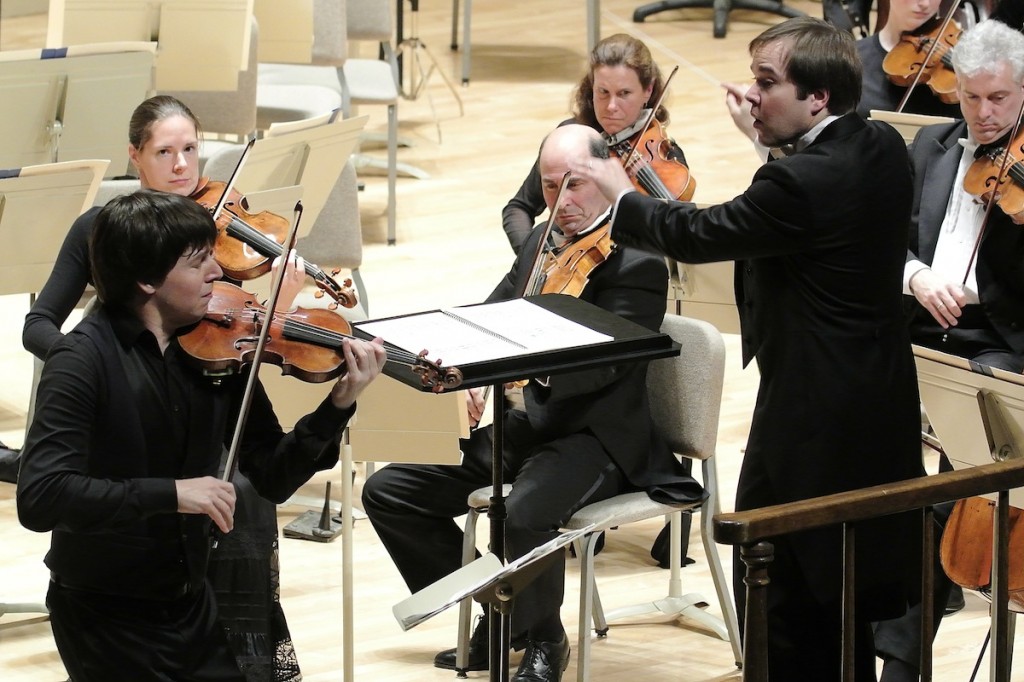Bell plays Bernstein with BSO yet Lehninger’s thrilling Dvořák Eighth is the highlight

Joshua Bell performed Bernstein's "Serenade" with conductor Marcelo Lehninger and the BSO Thursday night at Symphony Hall. Photo: Stu Rosner
It was a night of shaky beginnings and strong finishes in Symphony Hall on Thursday, as the Boston Symphony Orchestra and its assistant conductor Marcelo Lehninger served up favorite works by Tchaikovsky and Dvořák along with Bernstein’s Serenade (after Plato’s “Symposium”). with Joshua Bell as violin soloist.
Over the evening’s span, Lehninger and the orchestra seemed to follow a darkness-to-light scenario, beginning with an underrehearsed-sounding performance of Tchaikovsky’s fantasy-overture Romeo and Juliet, then intermittently finding their footing in the Bernstein piece, and concluding with a rousing account of Dvořák’s Symphony No. 8.
Romeo and Juliet was the 31-year-old Russian composer’s first real calling card to the world, the piece that has made music lovers ever since spell “passion” with a capital T. When this piece is cooking, no fight music burns hotter, and no love theme soars higher.
Thursday’s performance never quite caught fire. The brooding opening bars seemed out of focus, with ragged entrances. Lehninger did marshal his troops for the fast and furious “conflict” theme, but even then (and thereafter) one found oneself admiring the skill of the players instead of being carried along by a surge of emotion.
The title and the five-movement form of Bernstein’s Serenade links it to entertaining “night music” pieces by Mozart, and this concertante piece for solo violin and string-and-percussion orchestra works well on those terms. But Bernstein, the Harvard man, couldn’t resist also including some classical allusions, and Thursday’s program book duly reprinted his notes attributing the movements to various philosophers expounding on love at Plato’s dinner party, an explanation that a listener might find more baffling than illuminating.
The piece opens with the violin alone, stating a long, loose-limbed fugue subject full of the wide melodic leaps that are Bernstein’s trademark. Soloist Bell was a little too loose at the outset, missing his high notes and playing a simple double-stop passage noticeably out of tune, and his somewhat raspy tone was another sign of inattention. Lehninger, however, expertly stirred the orchestra’s cocktail of Stravinskian neoclassicism in the strings and “Broadway Lenny” in the percussion.
The second movement was faintly characterized, needing more dolce in the quiet parts and more crackle in the witty pizzicato repartee, but the “physician” scherzo bubbled and flashed like circulating blood and firing neurons.
Like seemingly everything else at this concert, the love song of Agathon sounded a bit prosaic at first but gained heart as it went along, Bell playing the climactic forte double stops vibrantly and perfectly in tune. Soloist and orchestra vividly projected the finale, with its curious compound of Socrates’s imposing presence and Alcibiades’s drunken revelry; Bell’s hot fiddling at the end brought a roar of approval from the audience. One notes in passing that the foxtrot and blues elements that caused so much tut-tutting in 1955 are now pretty standard fare for Symphony Hall.
The Dvořák symphony also sounded tentative at first, but that was due as much to the piece’s curious way of introducing its attractive themes—play a nice tune, stop, play another one, stop—as to any defect in the conducting. As the themes began to combine and develop, Lehninger found the thread and wove the orchestra together beautifully, driving the music on to the exultant coda.
To ride the momentum of a fast movement is one thing, but to find the long thought in a movement that starts and stops as much as this symphony’s Adagio does was a true achievement, and Lehninger’s finest moment of the night. Through all the Eroica-like exclamations, interruptions, and pauses, the music seemed to grow with an organic inevitability.
Having reached that peak of concentration and execution, Lehninger’s performance never came down from it, even while seeming to float through the waltz-scherzo and meander blissfully through the finale’s colorful variations. It seemed as though every felicitous detail was in place, without calling attention to itself.
Even though individual players were singled out in the usual way during the bows, one felt as though the success of this performance belonged to the whole team, more than to a series of star turns. Even the brilliant flute variation in the finale—which is to symphonies what the piccolo part of The Stars and Stripes Forever is to band music—seemed, in Elizabeth Rowe’s smooth rendition, to blend in cohesively rather than stand out as a bravura solo turn.
The program will be repeated 1:30 p.m. Friday and 8 p.m. Saturday. The same program will be performed 8 p.m. Tuesday but with Schulhoff’s Concerto for String Quartet substituted for the Bernstein work. bso.org. 617-266-1200.
Posted in Performances





Posted Oct 05, 2012 at 7:42 pm by anna martina sodari
it’s nice to know that joshua bell is human . . . . i am finally listening to tucson’s apr classical music station all day long down here in little podunk sierra vista. i am very mellow these days . . . . . i do have a ticket for tucson symphony with joshua in february.